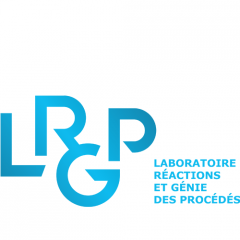In LRGP, approximately 15 persons (permanent staff, PhD and Master students, post-doctoral fellows) are active in the field of hydrometallurgy. They belong to the PERSEVAL and Product engineering groups. These groups have an expertise in the scientific fields necessary for the design of physico-chemical and electrochemical recovery or reduction of metals and their scientific fields encompass: speciation, physical chemistry, electrochemistry, precipitation, chemical engineering (heat and mass transfer, multiphase flow) and Life Cycle Assessment.
By organizing this transverse subject, LRGP intends to increase its visibility in the field of hydrometallurgy processes. Two successful research meetings were organized, grouping teams active in hydrometallurgy in Lorraine (IJL, Géoressources) and the rest of France (CEA, LGC, team RMMD, Chemistry institute Paris) and industrial groups. A national research group (GdR) “Hydrometallurgy” is being organized.
Hydrogen is a major topic of research in Lorraine. Research in this field groups laboratories from Lorraine University/CNRD (LRGP, LEMTA, IJL, GREEN, etc), CEA and industrial companies. A joined experimental platform is planned in order to increase the visibility of this action in the frame of the IMPACT project of the ISITE LUE (Lorraine Université d’Excellence). Some laboratories in the field of innovation and of human and social sciences have joined this project.
In LRGP, this concerns a number of research topics:
-
- Hydrogen production by methane reforming,
- Gas separation by membrane processes,
- Optimal design and integration of energy systems (PRIMO),
- Hydrogen production by biotechnology (BIOPROMO) or by pyrolysis/gasification (CITHERE),
- Material design for the photolytic production of H2.
An analysis of the forces of the laboratory in the more general field of energy has also been undertaken.
The biorefinery concept is a central topic of sustainable chemistry, one of the pillars of the Horizon 2020 program of the European Union. LRGP is active in this field. 13 projects concerning the 5 research axes of the laboratory have been identified in a synthesis paper and 20 staff members are concerned.
The topics treated in the frame of national or European projects encompass:
-
- Upstream treatment of vegetal resources (e.g. supercritical oil extraction from rapeseed),
- Thermal transformation of biomass (e.g. gasification and synthesis gas production, aromatics production by lignin pyrolysis),
- Biological treatment of biomass (production of valuable products from sugars),
- Catalytic conversion of biomolecules (e.g. transesterification of lipids),
- Enzymatic conversion of biomolecules (e.g. acylation of peptids),
- Separation and purification processes (membranes, chromatography),
- And Biosourced product design (acrylic polymers).
This work is made possible by a number of methodological tools that LRGP has at its disposal: process modelling (bioreactors, catalytic reactors, bioseparations), global simulation of a route in a PSE-like environment, safety analysis, Life Cycle Assessment (LCA).
This field concerns about 20 persons (permanent staff, post-docs, PhD and Master students), of the axes PERSEVAL, PRIMO and BIOPROMO who work on different parts of the CO2 capture and utilisation.
Part of this work is made in the frame of the Valorco project (PIA ADEME). This transverse subject presents 3 parts:
- In the first part, high efficiency filtration of fine particles in hot gases with limited clogging of the filter is investigated in order to limit the energy expenditure and to allow thermochemical or biotechnological utilisation of the gases.
- The second part concerns CO2 capture by membrane processes. These allow to obtain, with a small energy consumption, either CO2/CO/H2 mixtures that can be utilised together, or the same gases separately, which can be utilised in chemical or biological processes.
- The third part presents different aspects:
o Transformation of CO2 into methane by using an intensified anaerobic digester,
o The exogeneous production of bio-hydrogen enabling the co-valorization of CO2,
o Thermocatalytical transformation of CO2 into methane (methanation), methanol or dimethylether in intensified reactors.
- The third part presents different aspects:
